
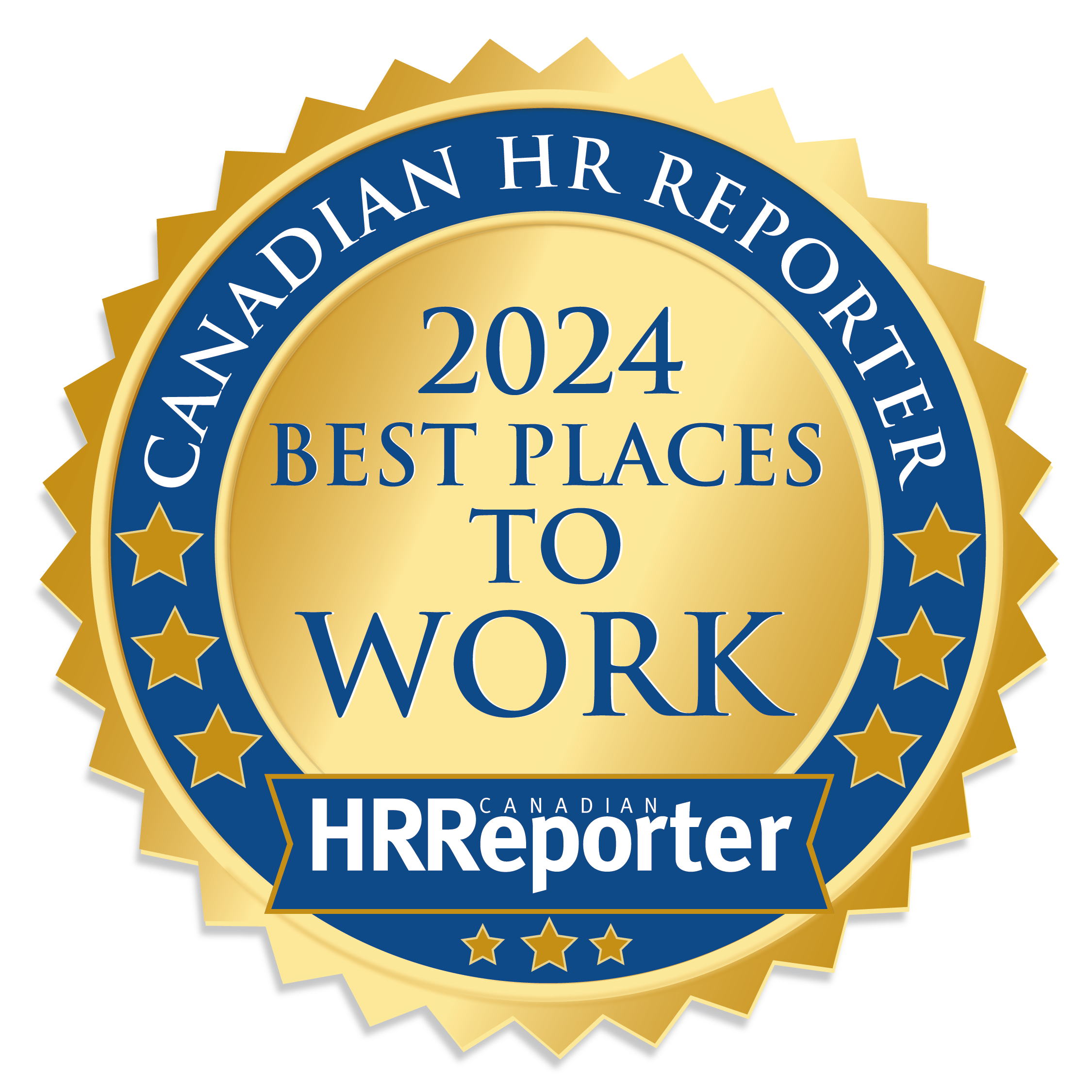
Jump to winners | Jump to methodology
Canadians are placing greater importance on receiving health insurance benefits from their employers than they did in 2023.
That’s according to Canadian HR Reporter’s data that medical coverage, dental coverage and long-term care have all increased as a priority relative to 12 months ago. This is mirrored in their attitude to bonus/incentive programs, where Canadians employees are also above the global average – 82 percent global/87 percent Canada – when it comes to the importance of being fairly paid.
In addition, CHRR’s 2024 survey revealed team building and social activities, support for community, charity or philanthropic organization and initiatives, and support for green or sustainable business practices or programs remain as they were in 2023, the least important factors that employees seek from their employers.
“While this might be surprising to some, given the current emphasis on environmental and socially conscious initiatives, it’s actually consistent with what we know about key drivers of employee engagement,” says Greg Hussey, CEO of Impact HR.
“Based on our observations of workplaces and interactions with employees, the most important things that employees look for in an employer, and thus are higher drivers of engagement, include things like meaningful work, recognition, opportunities for development, flexibility in work schedule or working from home, supportive and empathetic leadership, transparency from leadership, and decision-making autonomy.”
While social activities, charitable initiatives, and social/environmental responsibility initiatives are certainly valuable, they don’t always have the same direct impact on engagement as other drivers. Employees may appreciate being part of an organization that contributes to these areas, but their individual engagement is more likely influenced by how they feel about their own work and relationships.
Hussey adds, “It’s important for employers not to abandon these activities, as they still contribute to the overall employee experience.”
CHRR’s Best Places to Work winners 2024 display an eclectic mix of employee-centred programs, strong compensation and benefits, while fostering a safe workplace. These best companies to work for in Canada offer employee work-life balance, training and education, and reward through incentives and bonuses.
Supporting CHRR’s data and winners list is the findings from Mercer’s 2023–24 CA Inside Employees’ Minds Survey, which shows that pay and healthcare benefits are the top two factors for employees to remain with their current organization.
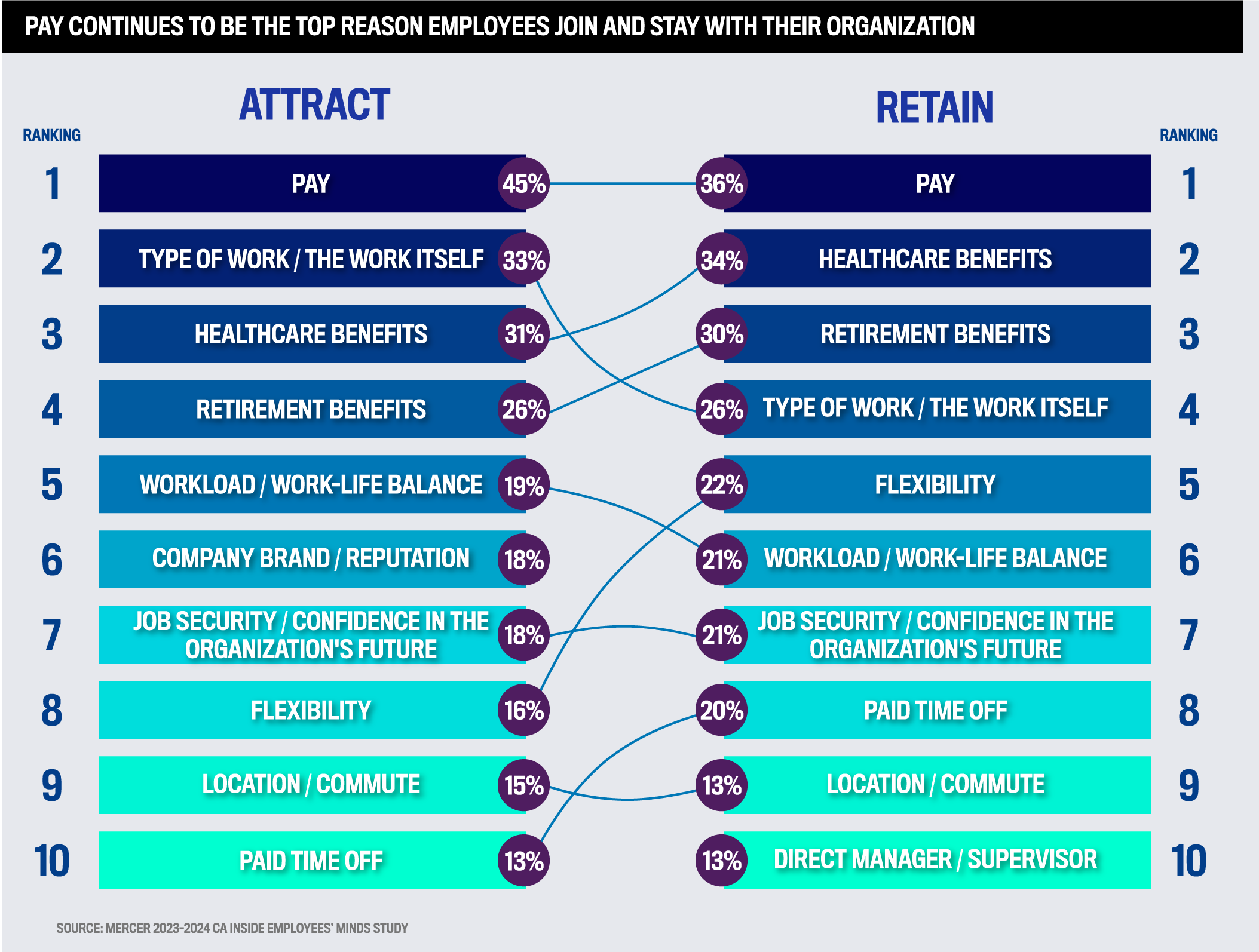
These findings are crucial for employers to respond to, as nationally there are now 1.36 million businesses with employees, a 4.3 percent increase since 2020, which means there is competition to attract and retain staff.
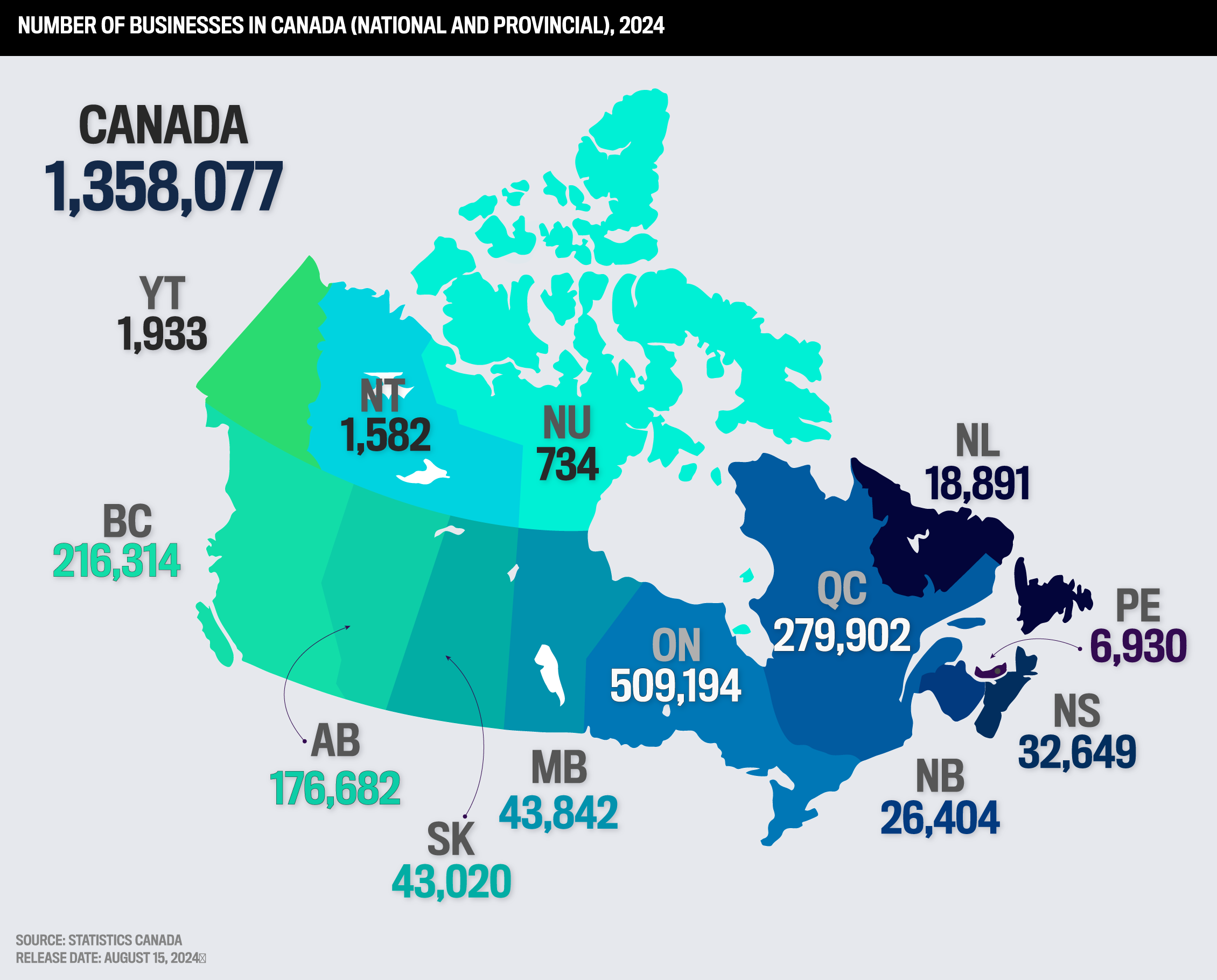
To determine the 2024 winners, CHRR surveyed thousands of employees across the country, who praised their employers for:
creating a welcoming and encouraging workplace culture
providing a generous benefits plan, covering medical, dental, and vision
committing to diversity, equity, and inclusion (DE&I)
rewarding employees’ performances through incentives and bonuses
offering flexible working arrangements
“The needs of the workforce have changed in the last 5–10 years. The market-leading workplaces are those that keep up with those changes in needs and can adapt,” says Hussey. “During the pandemic, with working from home or remote work, organizations that were able to adapt to that quickly were more successful. Employers who can stay ahead of that and keep their employees engaged throughout this period are market-leading places to work.”
According to director of HR advisory services at McClean & Company, Margaret Cowx, companies should focus on:
employee engagement, experience, and sentiment
mission, corporate and social responsibility
leadership
work environment
opportunity for professional development and career growth
brand and performance
These factors are important components that impact a person’s day-to-day experience at work and the level of fulfillment and joy they experience in their work life,” says Cowx. “The absence of these elements can lead to feelings of demotivation and disengagement, which often leads to these employees ending up being detractors to the company.”
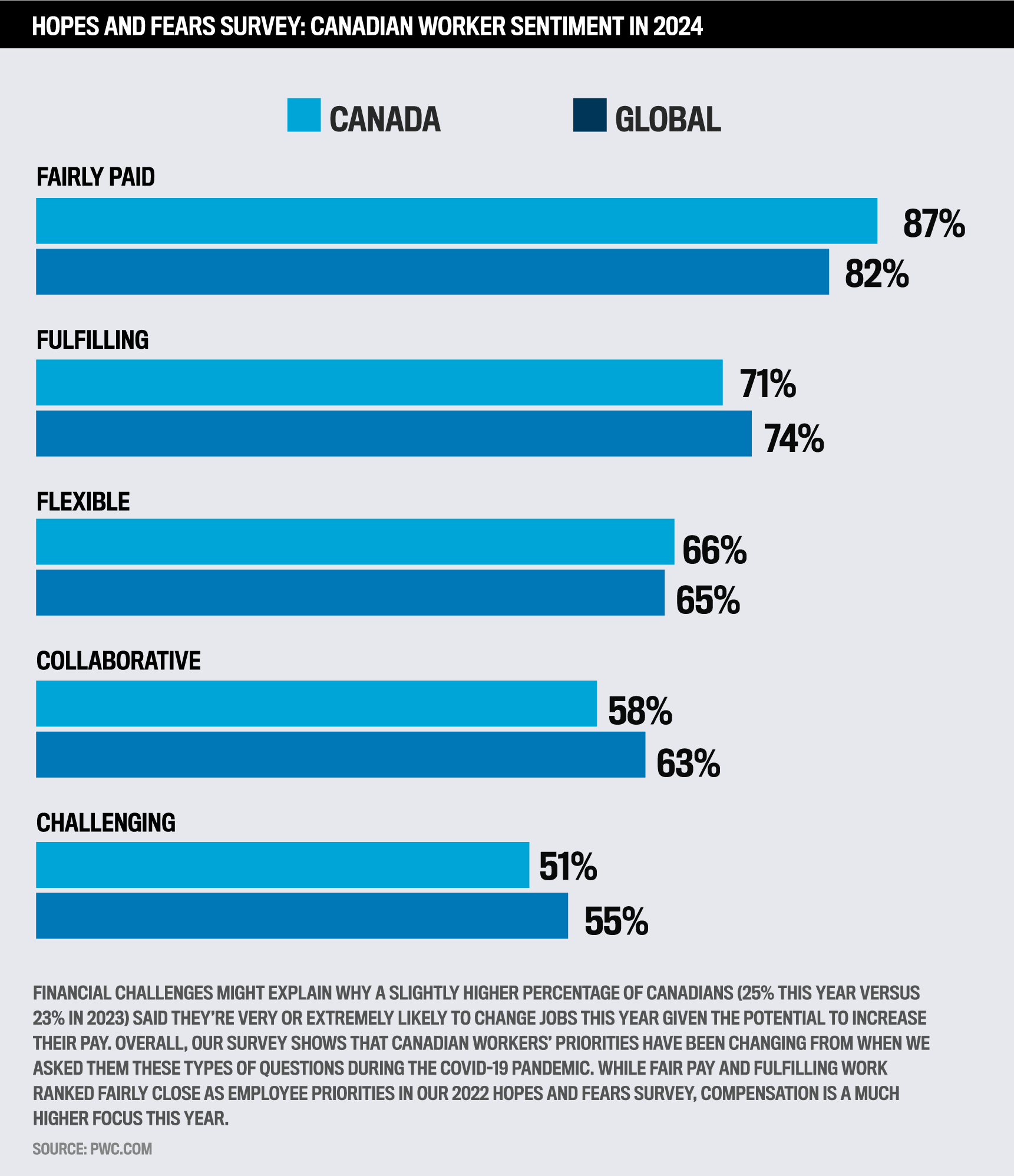
Location: Toronto, ON
Employee satisfaction rating: 83 percent
Providing the college sector with benefit plans since 1967, the company has enjoyed major growth since 2018 after opening its doors to private organizations. CAAT’s workforce grew from 84 people to over 500 in 2024, and in May of that year, it celebrated reaching 100,000 members.
Serving more than 440 employers in 20 different industries, CAAT’s membership is made up of for-profit, not-for-profit, and the broader public sector.


Striving to provide lifetime retirement income to more Canadians, CAAT is known for its pension investment management expertise and focus on stability and benefit security.
CAAT scored well with its employees for the retirement plan offered by the organization and having a safe work environment.
The organization’s people strategy has three core values:
building capacity – ensuring its workforce can meet demand
improving capabilities – upskilling its employees through training programs
enhancing culture – engaging and inspiring its employees
“I strongly believe our culture is what distinguishes us and helps us outperform other organizations,” says chief human resources officer, Julie Giraldi.
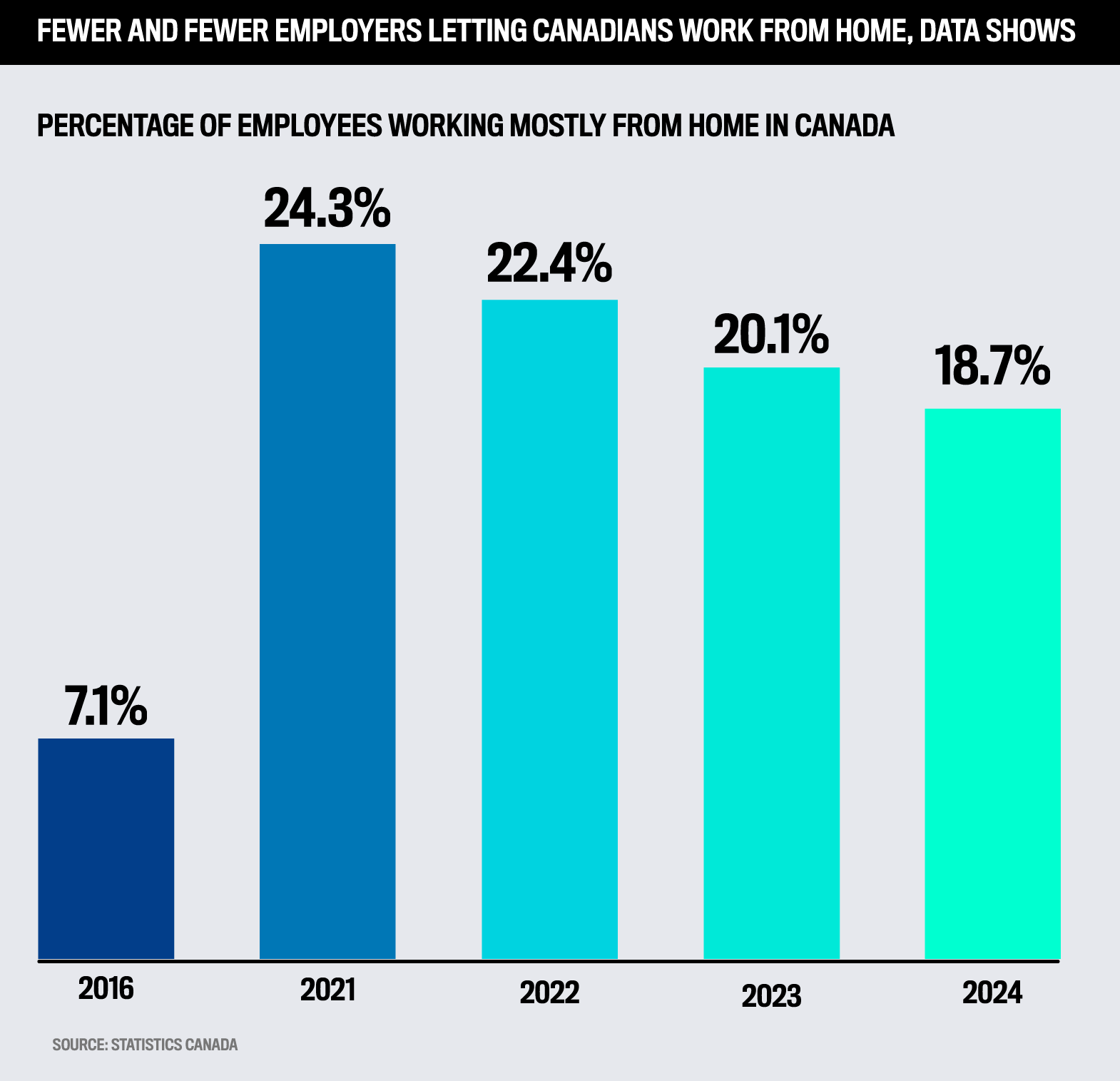
Location: Winnipeg, MB
Employee satisfaction rating: 82 percent
A non-profit industry organization representing the canola oil industry, including exporters, processors, life science, companies, and producers, the Canola Council of Canada has an employee base of 30, emboldening a culture of:
respectfulness
hard work
dedication
recognition


“Our team is doing an incredible job managing a high workload. We ensure we hire staff that are highly focused, adaptable who believe no job is too big or too small. Everyone is willing to pitch in which allows us to meet our goals effectively” says senior director of finance, HR, and administration, Cari Mell.
In CHRR’s survey, employees are satisfied with its family-friendly benefits, retirement plans, dedication to DE&I, and team building/social activities.
Location: Edmonton, AB
Employee satisfaction rating: 78 percent
A non-profit providing mental health services to children and young adolescents for almost four decades, CASA Mental Health’s workforce has more than doubled to 350 over the past two years due to increased demand and expansion.
The organization is lauded by employees for providing flexible work arrangements, its commitment to DE&I, allowing a strong work-life balance, and its charitable work in the community.


Given the sector it operates in, CASA is cognizant of its employees’ mental health while fostering a culture of accountability and kindness.
“Because we’re a nonprofit organization, we need to be mindful of every dollar we spend to ensure all children get our services,” says Bonnie Blakley, CEO. “We want to provide kindness to our employees and in turn those who we serve. It’s all about working with a purpose.”
Location: London, ON
Employee satisfaction rating: 88 percent
Founded in 1996, the organization provides cutting-edge software to the insurance industry. Its decision in 2021 to pivot from a legacy platform to a web-based platform software-as-a-service (SaaS) company under new CEO Matt Scott has reenergized and revitalized the company.
With almost 85 employees, Cognition+ has expanded into new markets, including its first client in Quebec in 2024.


“We’ve just been seeing a lot of success recently. So, we’ve added new clients, which we hadn’t done many years previously,” explains HR manager, Katie Thibeault. “We want people who are hungry to learn about new things and want to be part of something bigger.”
Location: Brampton, ON
Employee satisfaction rating: 81 percent
Founded in 1876, it is one of the largest mutual insurance companies in Ontario providing home, auto, commercial, and farm insurance. Peel Mutual focuses on creating a sense of community. Its ‘winning behaviours’ include:
knowledge sharing
collaboration
integrity


“We have created sustainable, profitable growth through a customer-centric experience built on trust, community, and strong relationships,” notes vice president, people and operations, Matt LeMaire.
The organization is rated highly among respondents for creating good relationships with coworkers, providing workplace flexibility, and having a strong work-life balance.
Location: Oakville, ON
Employee satisfaction rating: 84 percent
The company provides HR, payroll, and staffing services to small to medium-sized privately owned organizations in the Greater Toronto Area since 1981. Employing 86 people across all disciplines while enjoying continued success, Pivotal Integrated HR Solutions aims to ensure they service clientele efficiently.
“We’re a HR department for companies who don’t have HR departments,” says president of HR management and partner, Mike Salveta. “I’m not looking for hyper growth, but controlled growth. We have a unique culture led by our team leaders.”


He continues, “If we became too big, our uniqueness would be lost. We’re good at being client intimate – that’s our core strategy.”
Pivotal earns plaudits from employees for its relationship among co-workers, flexibility, work-life balance, and how the organization engages with the workforce.
Industry expert Hussey states there is a need for continuous improvement and upskilling due to technological advancements.
“In some industries, there’s a threat of employees losing jobs due to AI or where there are projected job losses, which means there’s more pressure to help employees and give them the opportunity to learn new things.”
CAAT Pension Plan has launched several learning and development platforms to upskill employees:
CAAT Academy – a hub giving employees access to thousands of online courses
Leaders Mindset – a flagship program helping emerging leaders with foundational skills
“We have a tuition program that supports employees and reimburses them for both career programs, as well as other programs,” explains Giraldi.
For the Canola Council of Canada, providing education is a priority.
“We have internal cyber training programs that employees can avail of. At our monthly staff meetings, one of the departments provides five minutes of education, be it in finance, internal controls, or government policy,” says Mell.
CASA Mental Health commits two percent, approximately $750,000, of its payroll to professional development and learning for employees. As a non-profit, it sources that money by fundraising or applying for grants and donors.
“Our staff constantly tell us they have more training opportunities than anywhere else they’ve worked,” reveals Blakley. “Every one of our programs has external training specific to the clinical competencies that staff are looking at.”
While improving their capabilities and knowledge, it also helps retain staff and benefit the community.
“We’re not asking for a return for service necessarily, but if they go and serve these kids, even if it’s not with us, using those skills and tools, we’re all better off as a society and a province.”
Since pivoting to a more modern approach, training and development has been integral for Cognition+.
The company pushes employees to further their education by offering:
paid-for courses with the Insurance Institute of Canada, a premier source of professional education and career development in the property and casualty insurance industry
over 20,000 online technical and soft skills courses through Udemy
training from the National Association of Mutual Insurance Companies, a thought leader within the industry, focusing on insurance trends
“Being a software company supporting insurance, we want to make sure that we're at the cutting edge on all the current trends,” comments Thibeault.
Staff at Peel Mutual Insurance Company are provided with opportunities to grow, with a palpable sense of camaraderie and collegiality. Offering internal training and leveraging external courses supports employees’ development.
“We reimburse for all upskilling that requires courses outside of the company, and regularly integrate those courses into ongoing development plans as we build our staff up,” comments LeMaire.
“We are heavily invested in growing our people and providing ample opportunities to see their career grow at Peel. Our philosophy is such that rather than employees worrying about needing to grow by looking elsewhere, they only need to push forward with us.”
Pivotal Integrated HR Solutions does not put any constraints on employees seeking education.
“A lot of our training is done on an informal basis internally, because we have so much experience with our team,” says senior HR director and operations lead, Monika Krosel. “If you’re self-driven, the sky is the limit.”
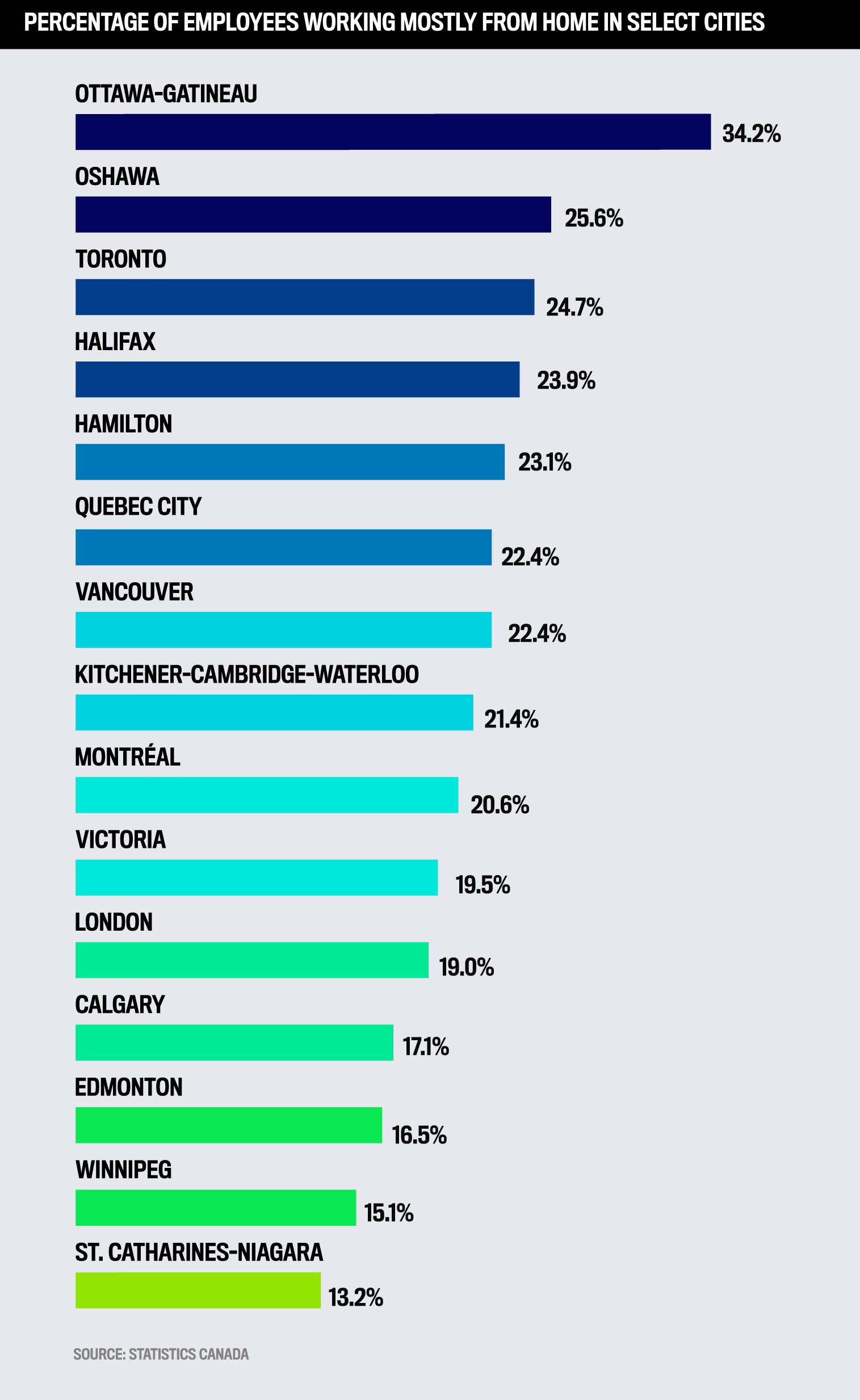
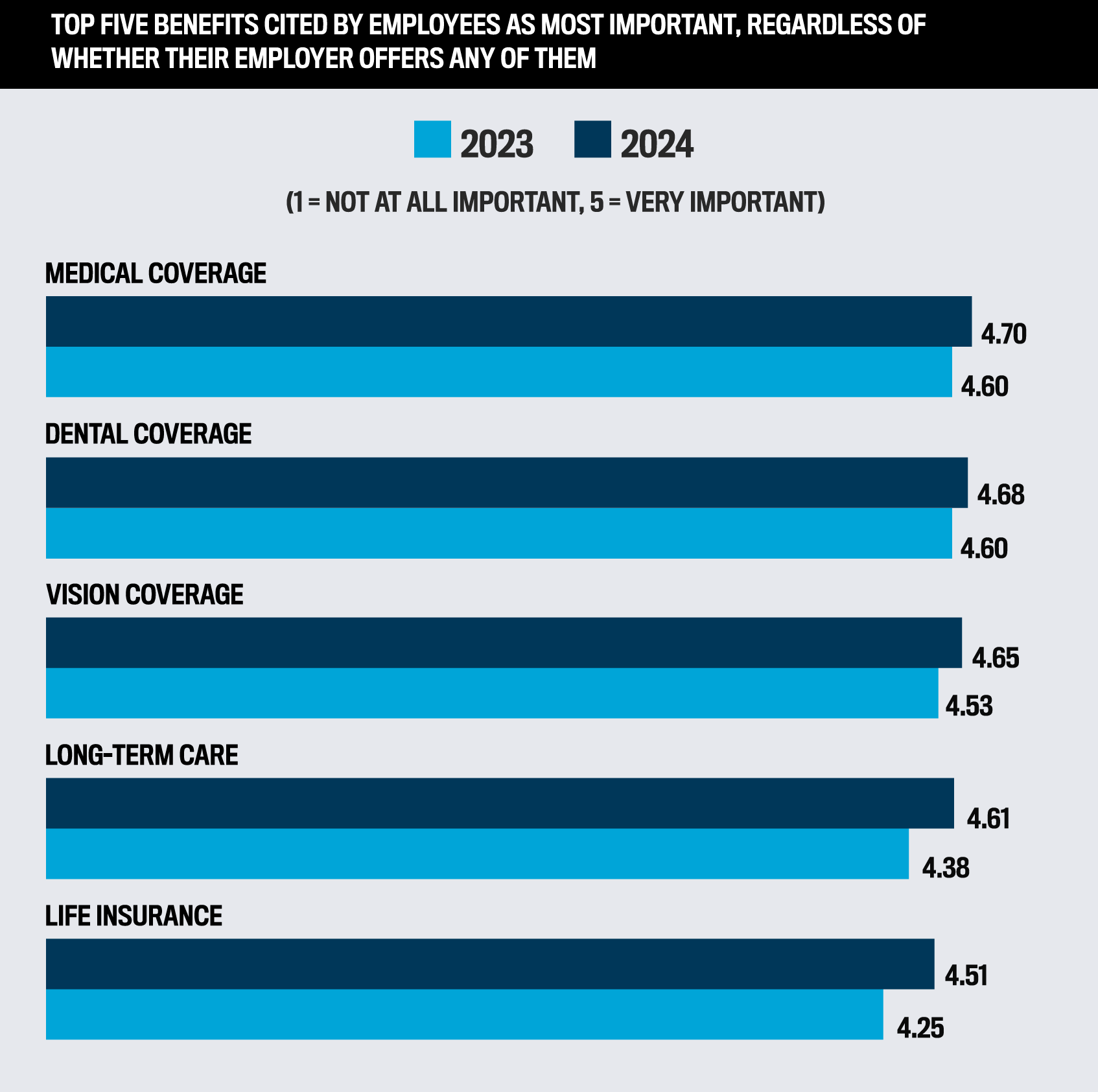
Travis O’Rourke, president of Hays Canada, believes the majority of companies can no longer refuse to offer flexibility.
“In 95 percent of industries, it’s an absolute must-have. It’s not just because you need to compete with the right talent. You owe it to your staff to provide them the flexibility that lets them live their lives,” he explains.
“You’re just doing a disservice if you tell them, ‘You must be in at this exact time’ and ‘You cannot leave until this exact time’. As an employer, you’d be foolish and mean to do it any other way.”
His colleague, senior director of hiring HR professionals, Taylor Housdon, agrees.
“You normally get more harder working and productive employees. It’s a major motivator for people. I know some candidates that leave roles they love after 10 years. They’re paid well, but they don't have flexibility,” he says. “You can keep your best employees by letting them be people, and they’ll work harder for you.”
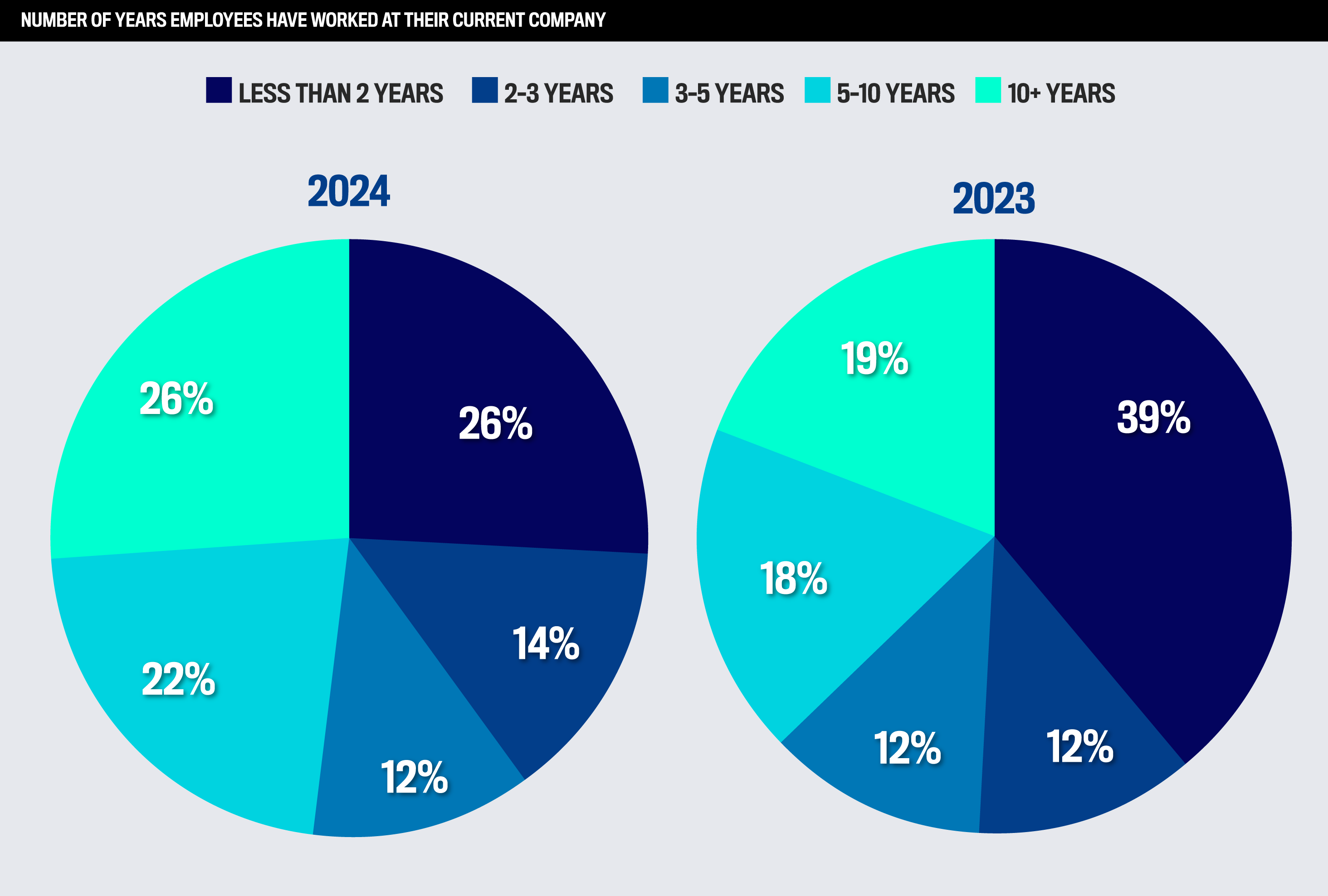
CAAT Pension Plan delegates the operation of its working model to individual departments within the organization.
“It’s at the discretion of the people leaders in our company,” says Giraldi. “Every department has different needs. Some are in the office once a week, others three times a week, while some come in once a month.”
This blend of meeting individual preferences and organizational needs is welcomed by employees.
She explains, “Eighty-eight percent of our employees are satisfied and feel their hybrid arrangements suit their needs, and we’re proud of that.”
Canola Council of Canada’s workforce is based in Winnipeg and Ottawa, but its agronomy employees are spread throughout the country.
“Our agronomy staff has always been remote,” reveals Mell. “Our other staff was full-time in the office until the pandemic, and now currently, we operate a hybrid model. It’s three days a week in the office, but that’s at the discretion of the employee.”
The Council’s approach works, resulting in an average employee tenure of 8.6 years.
CASA Mental Health’s service to young people throughout Alberta operates in schools, shelters, or one of its facilities, so providing flexibility can reduce burnout for workers.
“For staff who are not directly in contact with patients and families, almost everybody works in a hybrid role. We trust our staff and don’t need to see them to know they’re working. We try to provide that opportunity to all staff, if it can be accommodated within the work with the patient,” explains Blakely.
Being generous reaps rewards for CASA.
“Anyone who starts with us gets four weeks PTO, and if they need extra time off, we always try to accommodate it, because we know we’ll get that time back. The work we do is hard, and the staff who come to us are incredibly competent.”
Cognition+ shifted to a remote-first model and reduced its office size by a third in the past four years. Giving employees that autonomy has improved morale.
“We offer our employees training on how to work remotely, such as how to host meetings and communicate efficiently,” says Thibeault.
With that strategy, the organization tries to prevent employees from becoming isolated.
“We continue to host in-person events, but we are committed to a remote-first approach. We carve out the time to have dialogue, because you’re not by the water cooler having those conversations. It’s important to have that connection,” she comments.
Pivotal Integrated HR Solutions offers flexible working for employees, but it’s at the behest of clients’ needs.
“We have a healthy balance,” states HR director, Latoya Smith. “Employees may be required to be in the office a certain number of days per week, depending on the client they are working with.”
However, they have a unique model tailoring clients to the employee’s needs.
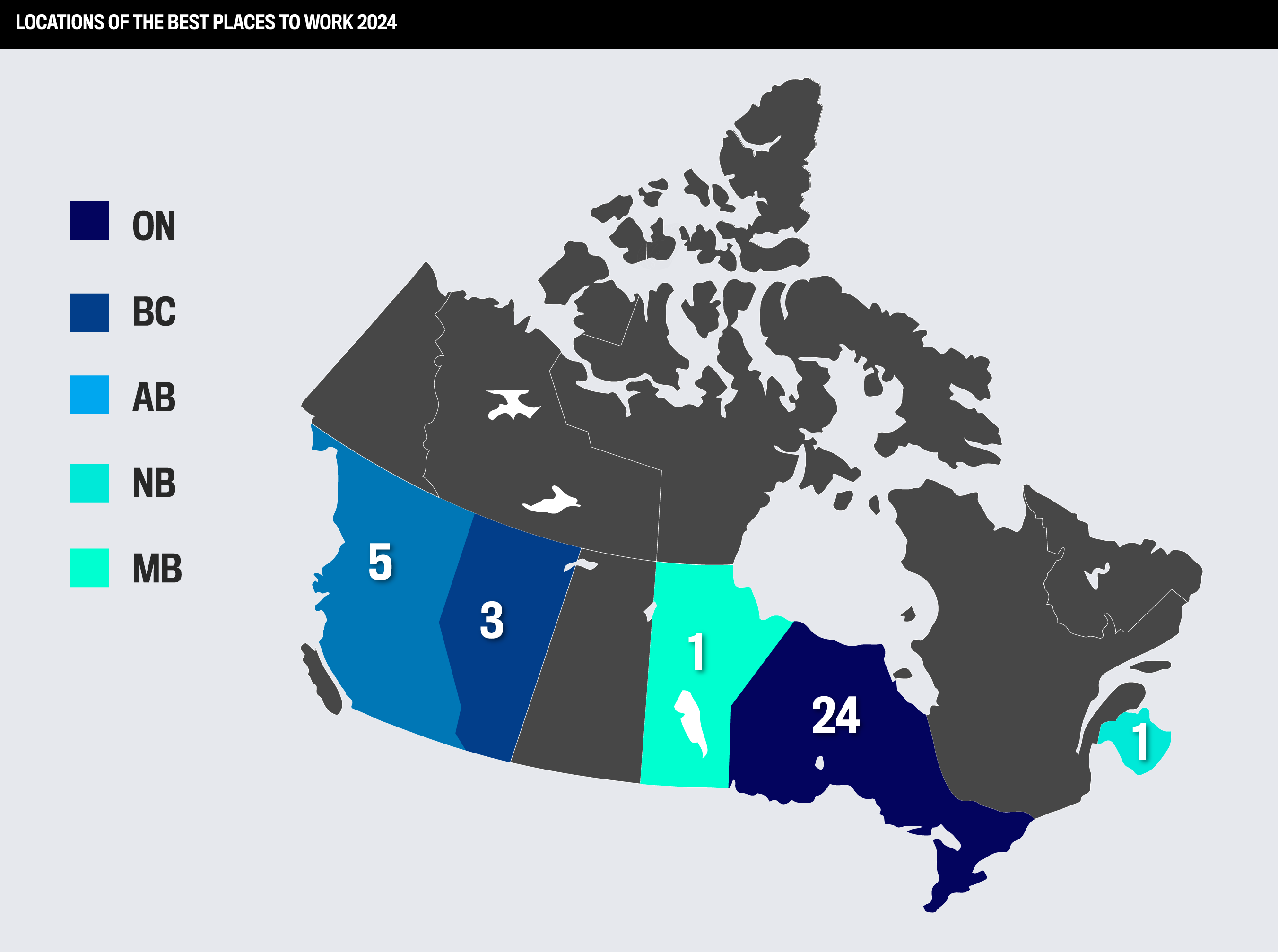
“We require you to be onsite as a member of the team at least once a week, but it’s not hard lined. If you need to collect your children from school and it will cost an extra $1,000 a month for childcare, we accommodate [it] with a client where you can leave at that time,” reveals senior HR director, Michelle McDowell.
Through its dedicated program called Agile Working, Peel Mutual Insurance Company breaks its roles into three designations:
in-office
hybrid
fully flexible
“Nearly 95 percent of our roles are classified as fully flexible, which allows our staff to work from nearly anywhere in Canada at their most comfortable and productive,” says LeMaire.
This program has improved staff morale considerably and is one of the main factors in the company’s 90+ employer net promoter score since 2020.
“Staff are provided with the technology they need to do their best work, and we regularly review their needs to optimize their setup. Remote work has been a boon for our organization as we are able to provide a wonderful and engaging employee experience regardless of location,” LeMaire adds.





The entry process for the 2024 Best Places to Work comprised two steps: an employer submission followed by an employee survey. First, organizations had to complete an in-depth questionnaire looking at key factors such as employee engagement, turnover rates, average tenure of staff, compensation and benefits, health and wellness programs, diversity initiatives, professional development, corporate culture, flexible work options, reward and recognition, and green programs.
Companies that successfully completed the submission phase were then sent a link to an online employee survey to be circulated internally. To ensure the integrity of the data collected, employees were requested to provide their company email addresses.
To be eligible for the Best Places to Work recognition, organizations had to meet a minimum number of responses based on company size. The survey asked employees to rate their company across a range of metrics that constituted drivers of employee satisfaction. An employer needed to achieve an overall satisfaction rating of at least 75 percent to be recognized as a Best Place to Work.